ọ [ɔ̀] pron. 3rd per. sgl. pronoun: he,
she, it; usually functions as subject
of the clause or sentence in which
it occurs: Ọ gbe ẹwe ― “He killed
a goat.”

ọba- [ɔba] int. a formula of salutation
which is prefixed to various words
designating times, seasons, occupa-
tions, dispositions, etc. in greeting
on appropriate situations: ọbota (<
%%

ọba ― ota) “greetings of the evening.”
Good-evening! ọbiwinna (< ọba ―
iwinna) “Greetings as you work!”, etc.
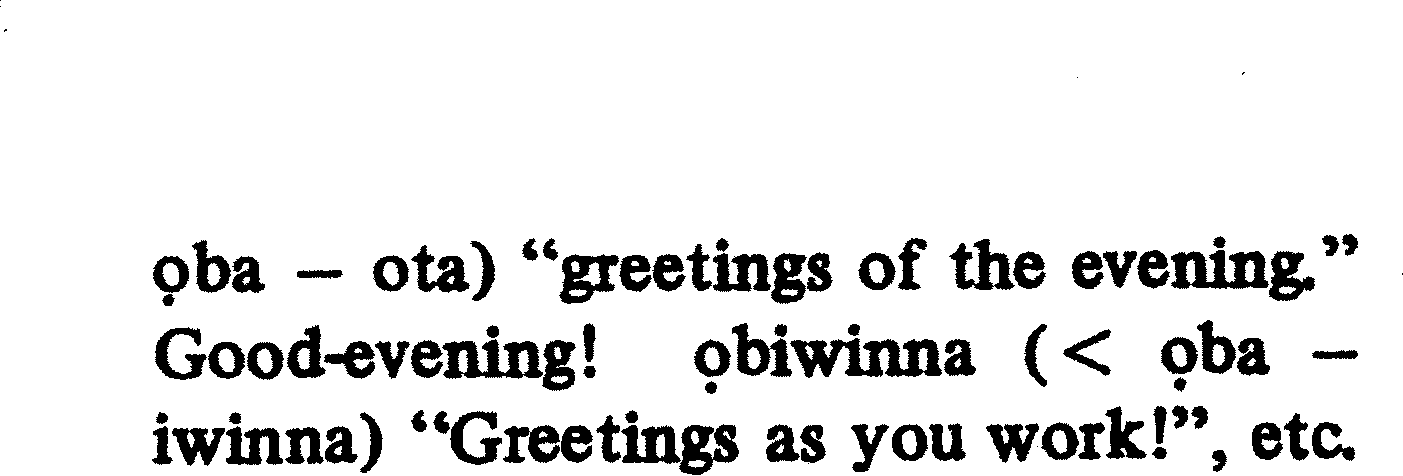
Ọba [ɔ́bá] n. 1. The ruler of Benin
kingdom; 2. (without the captial
letter): king; ruler. Ẹvbo na i mwẹn
ọba ― “This town has no ruler.”

ọbadan [ɔ̀bàdã̀] n. almond tree;
ọmọbadan ― “almond fruit and seed.”
$Page 118$

ọbafi [ɔ̀bàfí] n. hunting trip; hunting:
Erhae rrie ọbafi ― “His father is going
a-hunting.”

ọbaikpo [ɔ̀bàik͡pó] n. male lizard.

ọbavan [ɔ́bávã̀] int. Good afternoon
(cf. Ọba).

ọbevbaru [ɔ́béʋàɽú] int. well-done (cf.
ọba).

ọbiro [ɔ̀bíɽò] n. oracler; a diviner.

ọbo [ɔ̀bó] n. 1. a general term for
various categories of doctors: ọbo-
ọrọnmila ― “diviner”; ọbo-itan ―
“ordeal doctor”; ọbo-ebe ― “a Ph.D.
holder”^; etc.; 2. ritual priests of various
gods or deities.
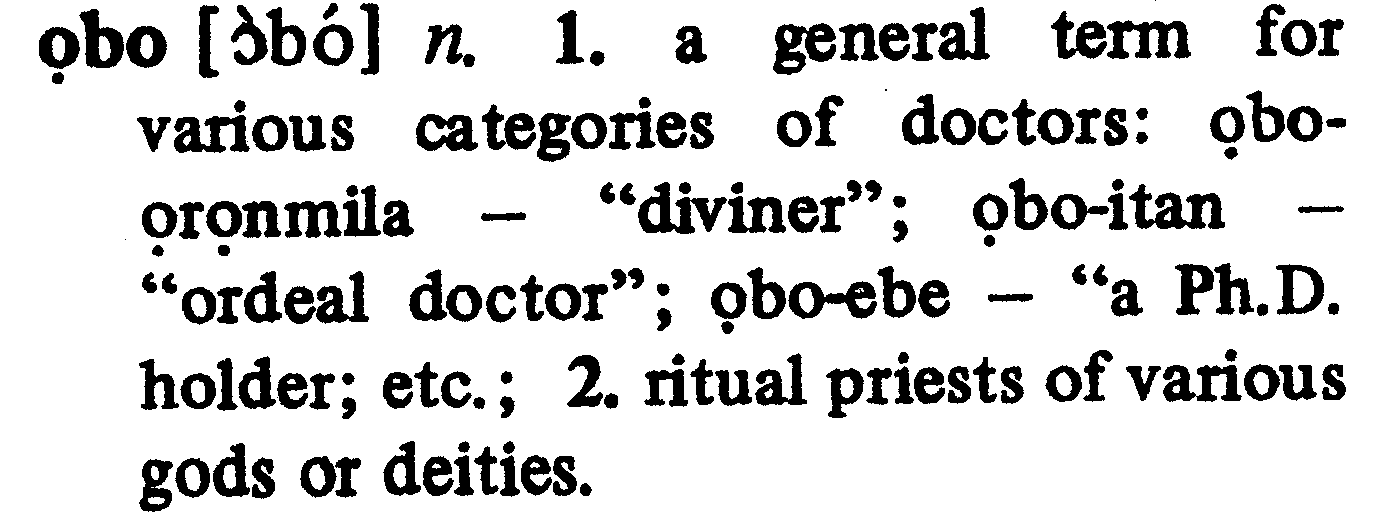
ọbokhian [ɔ́bóxyã̀] int. welcome!

ọbolokan [ɔ́bòlòkã̀] adj.; adv. without
soup or sauce: Ẹba ọbolokan ẹre ọ
mu nẹẹn re ― “It was eba without
soup that she gave him to eat.” Ọ
rri ọre ọbolokan ― “He ate it without
soup.”
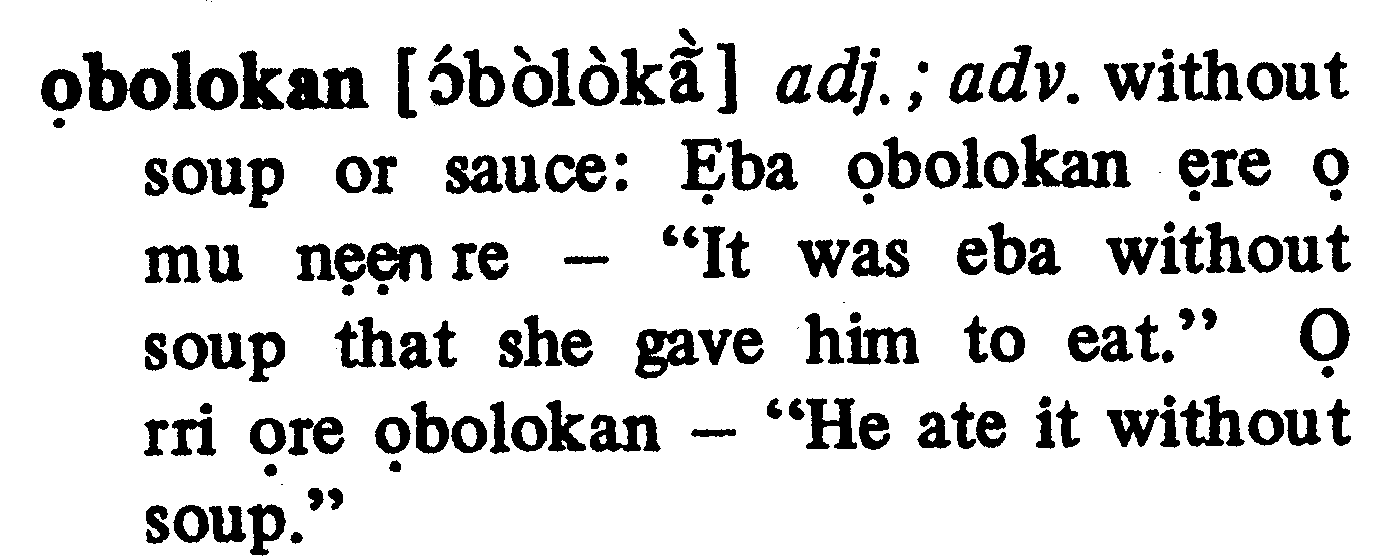
ọbota [ɔ́bótà] int. Good evening!

ọbowa [ɔ̀bòwà] n. house-builder.

ọbowa [ɔ́bówà] int. a greeting ex-
pressed by a new arriver to people
met at home on arrival. “Greetings
for staying at home.”

ọbowiẹ [ɔ́bówiɛ̀] int. Good morning!

ọbude [ɔ̀bùdè] n. adviser; counsellor.

ọbuohiẹn [ɔ̀bwòhyɛ̃̀] n. judge.

ọdafẹn [ɔ̀dàfɛ̃̀] n. 1. husband (usually
occurs with noun or pronoun indicat-
ing whose husband it is)^: Ọdafẹn
mwẹn ― “My husband”; ọdafẹn
%%

ọnrẹn ― “her husband, etc.” (also
ọdọ).; 2. a man who is a head of
household.

ọdan [ɔ̀dã́] n. gum; glue.

ọdayọn [ɔ̀dàyɔ̃̀] n. an excessive drinker
of alcoholic drinks; a drunkard.

ọdẹkuẹn [ɔ̀dɛ̀kwɛ̃́] n. sale on credit.

ọdẹn [ɔ́dɛ̃̀] n. joke; jest.: Ọ gha gu
iran gbe ọdẹn ― “He is having a joke
with them.”

ọdiọn [ɔ̀dyɔ̃́] n. 1. oldest (chronological-
ly). Ozo ọ re ọdiọn vbe uwu iran ―
“Ozo is the oldest among them.”;
2. the primary thing; the most im-
portant; the first; Vbe uwu emwin
hia ne u ziro ẹre re na, owa nabọ ọre
ọdiọn: “Of all the things you have
just suggested, house-building is the
most important.”
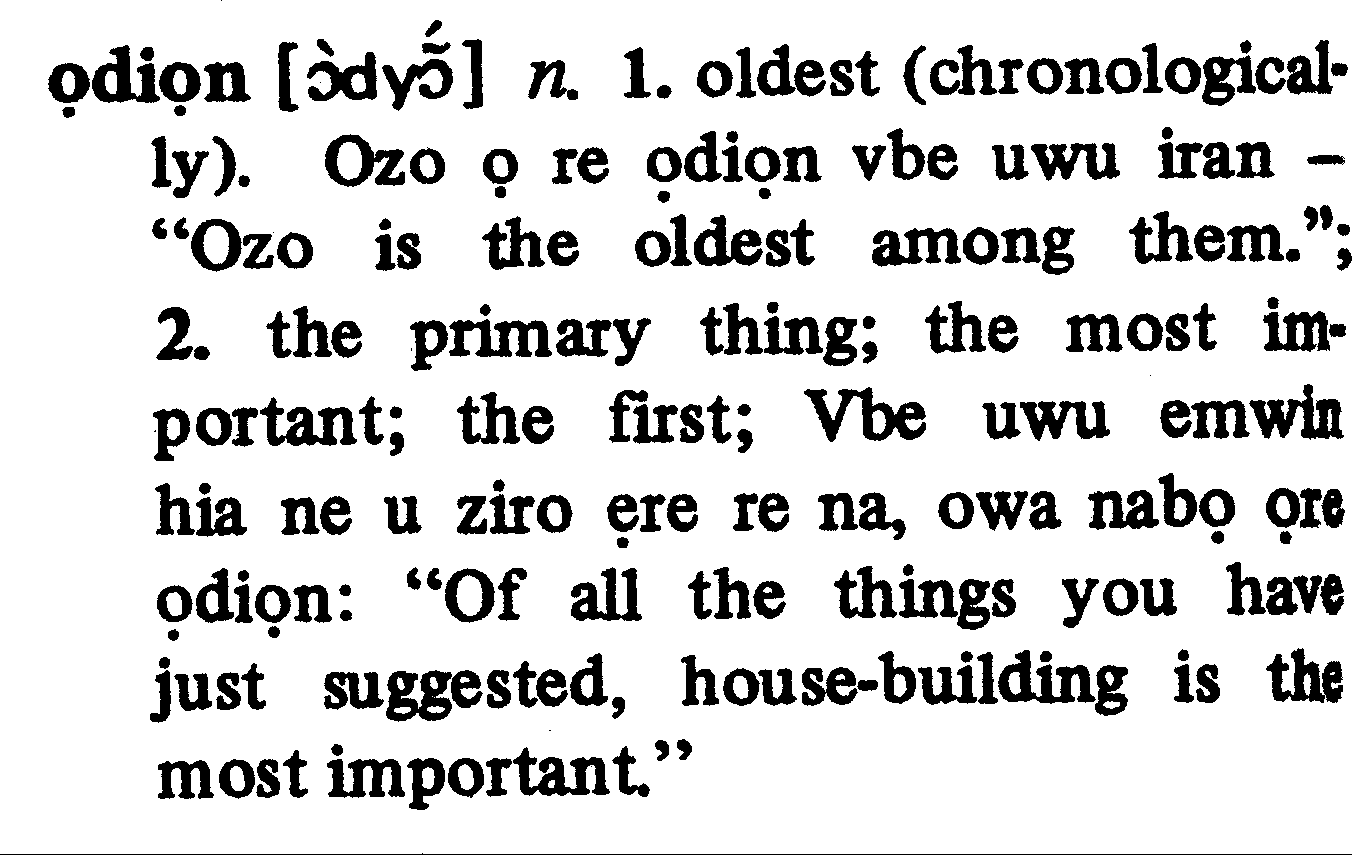
ọdọ [ɔ̀dɔ̀] n. 1. husband; 2. an ad-
dress term for relatives of husband.
Lahọ, ọdọ mwẹn, daeyi mẹ ― “Please,
my husband’s relative, hold it for
me.”
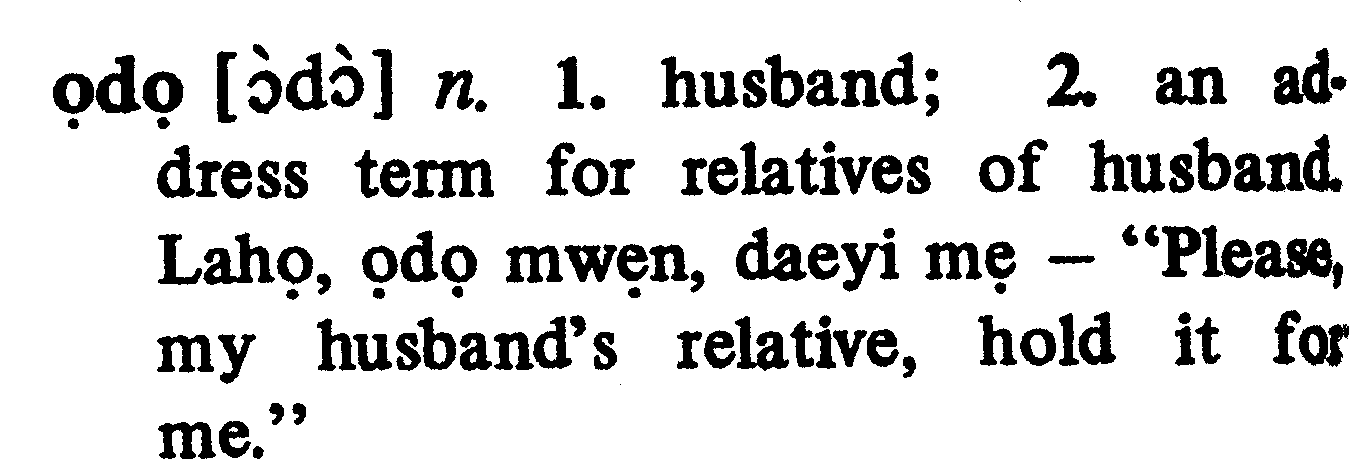
ọdọlukpọn [ɔ̀dɔ̀lùkpɔ̃̀] n. tailor (< ọ
― dọlọ ― ukpọn) “mender of cloth.”

ọduẹki [ɔ̀duɛ̀kì] n. 1. trader; 2. a
small measuring aluminium bowl used
for selling commodities like garri,
rice, beans, etc. mwaan ọduẹki isẹn
mẹ ― “Measure 5 bowls for me.”

ọdukpọn [ɔ̀dùkpɔ̃̀] n. weaver (of
fabrics).

ọfẹndin [ɔ̀fɛ̃̀dĩ̀] n. palm-nut reaper.

ọfiontọ [ɔ̀fĩṍtɔ̃̀] n. a big bush rat
(edible); locally referred to as a
“rabbit” in English, but is quite
different from the real rabbit.
$Page 119$

ọfọ [ɔ̀fɔ́] n. sweat; perspiration: Ọfọ fọ
gbe vbe ẹghẹ na ― “Sweat sweats a
lot at this time: one sweats a lot a
at this time.”

ọfuan [ɔ̀fùán] n. destruction; annihila-
tion (cf. fuan).

ọfunmwengbe [ɔ̀fũ̀ɱẽ̀gbè] n. com-
fort; peace. (< ọ― fu ― vbe ― egbe)
“coolness of the body”.

ọfurre [ɔ̀fúrè] n. (< ọ ― furre) “cool-
ness”: calmness, tranquility.

ọ̀ga [ɔ̀gá] n. boss; master.

ọ́ga [ɔ́gà] n. net.

ọgiodẹ [ɔ̀gyòdɛ̀] n. guide.

ọgiọrọ [ɔ̀gyɔ́ɽɔ́] n. heavy chain.

ọgọ́ [ɔ̀gɔ́] n. bottle.

ọgọ̀ [ɔ̀gɔ̀] n. palm-wine tapped from
the top of the raffia palm. (also ọgọrọ).

ọgọgọ [ɔ̀gɔ̀gɔ̀] n. (of a cock) cock’s
crest. (also etọghọtọghọ).

ọgọrọ [ɔ̀gɔ̀ɽɔ̀] n. same as ọgọ.

ọgua [ɔ̀gwá] n. the room which serves
as a “parlour” in the traditional
Edo house.

ọgueva [ɔ̀gwèvà] n. a double-faced
person, who fosters trouble by
stealthily backing both parties in a
quarrel.

ọguiẹzọ [ɔ̀gwỳɛzɔ̀] n. (< ọ-gui-ẹzọ)
“one who argues a case”: litigant.

ọguọmwandia [ɔ̀gwɔ̀ɱã̀dyà] n. “he
who stays with one”: a servant; a
house-help.
%%

ọgba [ɔ̀g͡bá] n. tap; faucet.

ọgbagba [ɔ̀g͡bàgbà] n. a row of
(things): ọgbagba owa ― “a row of
houses (on a street).”

ọgbakha [ɔ̀g͡bàxá] n. conference.

ọgbalama [ɔ̀g͡bàlàmà] n. a nosey per-
son; a busy-body.

ọgban [ɔ́g͡bã̀] num. thirty.

ọgbehẹn [ɔ̀g͡bèhɛ̃̀] n. (< ọ ― gbe ―
ehẹn) fisherman.

ọgbekpa [ɔ̀g͡bèkpà] n. (< ọ ― gbe ―
ekpa) boxer.

ọgbenbe [ɔ̀g͡bẽ̀bè] n. (< ọ ― gbẹn ―
ebe) clerk.

ọgbeni [ɔ̀g͡bènĩ̀] n. (< ọ ― gbe ― eni)
elephant-killer, elephant-hunter.

ọgbọlọfo [ɔ̀g͡bɔ̀lɔ́fò] n. public knowl-
edge; the open. Ẹmwẹn na dinna
ọgbọlọfọ nẹ ― “This word has now
become publicly known; it has reached
the open.”

ọgbọn [ɔ́g͡bɔ̃̀] n. new, fresh.

ọgbugbo [ɔ̀g͡bùgbò] n. (< ọ ― gbe ―
ugbo) “one who makes farms”, farmer.

ọghae [ɔ̀ɣaè] n. heat; warmth: mwọ-
ọnghae (< mwẹẹn ― oghae) “to
have heat”; hot.

ọghe [ɔ́ɣé] prep. 1. possessive particle:
of; belonging to: ọghe Ozo ― “Ozo’s”;
ọghe ima ― “ours”; 2. pertaining
to, concerning: ọghe owiẹ ― “pertain-
ing to the moming”; uyinmwẹn ọghe
ẹghẹnẹdẹ ― “behaviour of the old
days: traditional behaviour.” It
combines with pronouns and pro-
nominals to form expressions such
$Page 120$
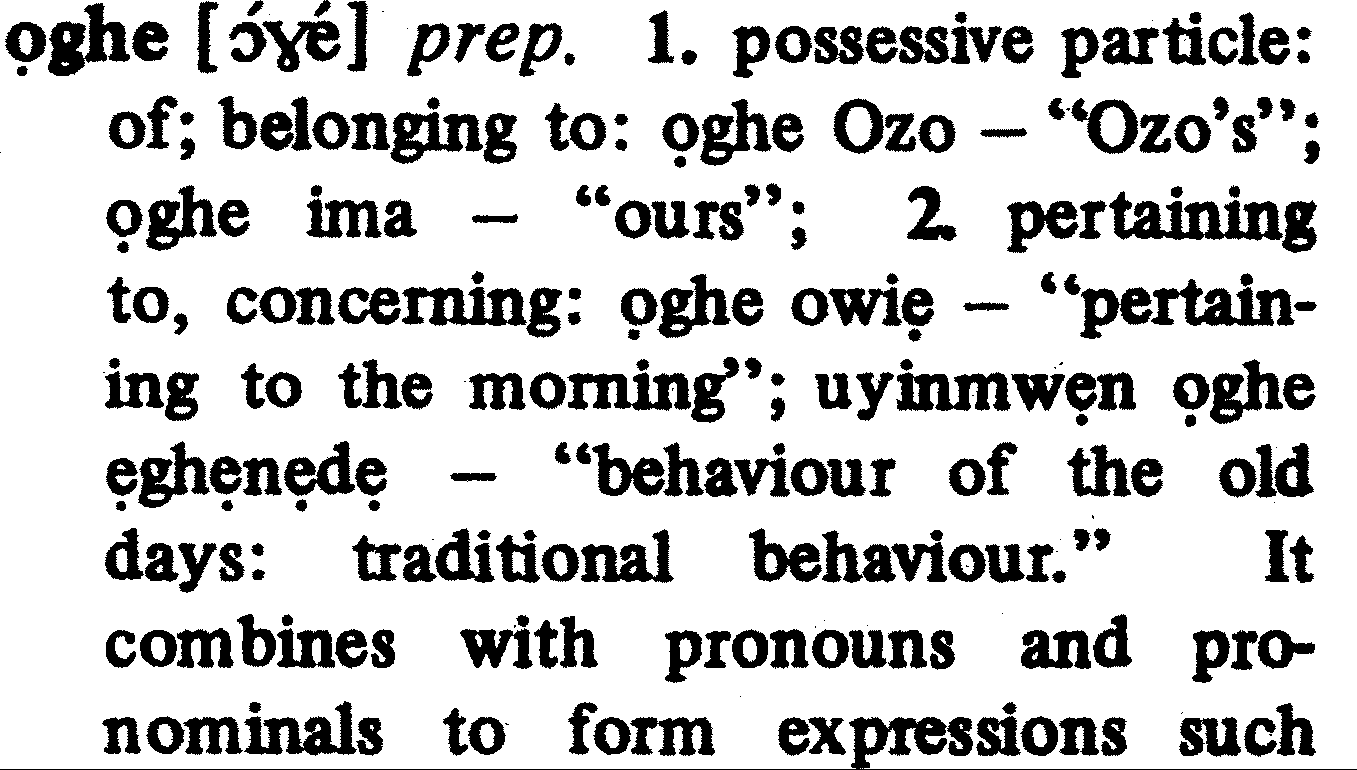
as: ọghuẹ ― “yours” (e.g.): ọghọe/
ọghẹe ― “his/hers/its”; ọghomwan ―
ours; oghiran ― theirs; ọghua ―
“yours” pl.; etc.

ọghẹdẹ [ɔ̀ɣɛ̀dɛ̀] n. plantain.

Ọghẹnnẹ [ɔ́ɣɛ̃̀nɛ̃́] n. 1. the Ẹdo name
for the Oni of Ife.

ọghẹrẹ [ɔ̀ɣɛ́ɽɛ̀] n. hymen; okhuo ne a
ma he fian ọnrẹn ọghẹrẹ ― “a woman
whose hymen has not been cut”:
a virgin.

ọghesi [ɔ́ɣésì] adv. very much; exceed-
ingly: iran gbẹe ọghesi ― “They
flogged him very much.”

ọghọ [ɔ̀ɣɔ̀] n. respect; deference.

ọghọdọ [ɔ̀ɣɔ̀dɔ̀] n. pond.

ọghọdọgbọ [ɔ̀ɣɔ̀dɔ́gbɔ̀] n. a kind of
weed: wild sugar-cane, not edible.

ọhá [ɔ̀há] n. bride.

ọhà [ɔ̀hà] n. catarrh; head-cold.: ọha
kpokpo mwẹn “catarrh is worrying
me”: I have catarrh.

ọhae [ɔ̀háè] n. 1. bachelor; 2. widower.

ọhẹ [ɔ̀hɛ́] n. 1. gift; 2. present.

ọhẹn [ɔ̀hɛ̃̀] n. a variety of red ants
that are found on fruit trees.

Ọhẹn [ɔ́hɛ̃̀] n. the name of a past
Ọba of Oba of Benin, who became
crippled in the later days of his reign.
He was the father of Ọba Ẹwuare.

ọ́ka [ɔ́kà] n. corn; maize.

ọ̀ka [ɔ̀ká] n. leader; usually followed
by the noun or pronoun denoting
what òka is leader of: ọ̀ka ẹgbẹe ―
%%

“leader of clan; head of family”;
ọ̀ka idunmwun ― “head of the
neighbourhood (same as ọdiọnwere).”

ọkade-ọkade [ɔ̀kádéɔkade] adv. step
by step; gradually.

ọkaruosa [ɔ̀káɽwòsà] n. debtor.

ọkemwionkọ [ɔ̀kèɱĩõ̀kɔ̀] n. (< ọ-kọ-
emwin-ọkọ) “crop-planter” large-scale
farmer; cash-crop farmer.

Ọkiẹkiẹ [ɔ̀kyɛ́kyɛ́] n. fore-play; love-
play.

ọkotọ [ɔ́kòtɔ̀] n. the bottom position;
the last: ọmọ-ọkotọ ― “the last born
child”.

ọkuẹkuẹ [ɔ̀kùɛ́kwɛ̀] n. jog; trot.

ọkuu [ɔ̀kúù] n. disaster; calamity; total
damage: Ọkuu ọkuu ọ ru lele oghian
mwẹn khian ― “Constant calamity
is what he keeps having after me;
i.e. He is forever encountering disaster
in all he does for me.”
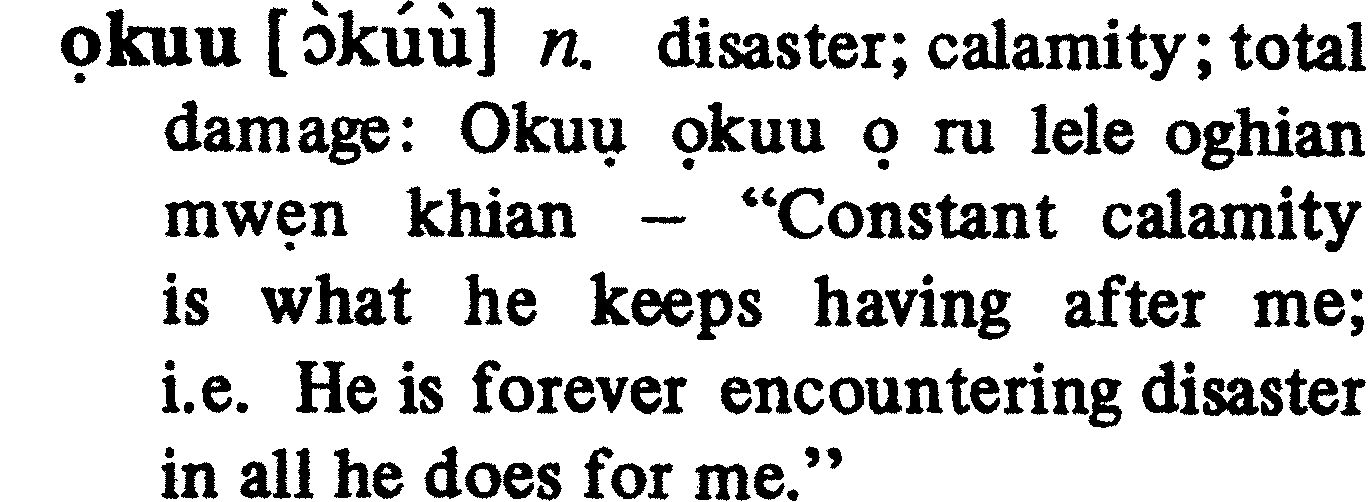
ọkha [ɔ́xá] n. the cotton-seed tree (ceiba
pentandra).

ọkhaẹmwẹn [ɔ̀xáɛ̀ɱɛ̃̀] n. chief;
special rank of traditional elders,
appointed by the Ọba. They discharge
various responsibilities within the tradi-
tional judicial system. The ọkhaẹmwẹn
status is less important than that
of an Ogie ― “a titled ruler” ― though
every ogie is by implication an
ọkhaẹmwẹn.
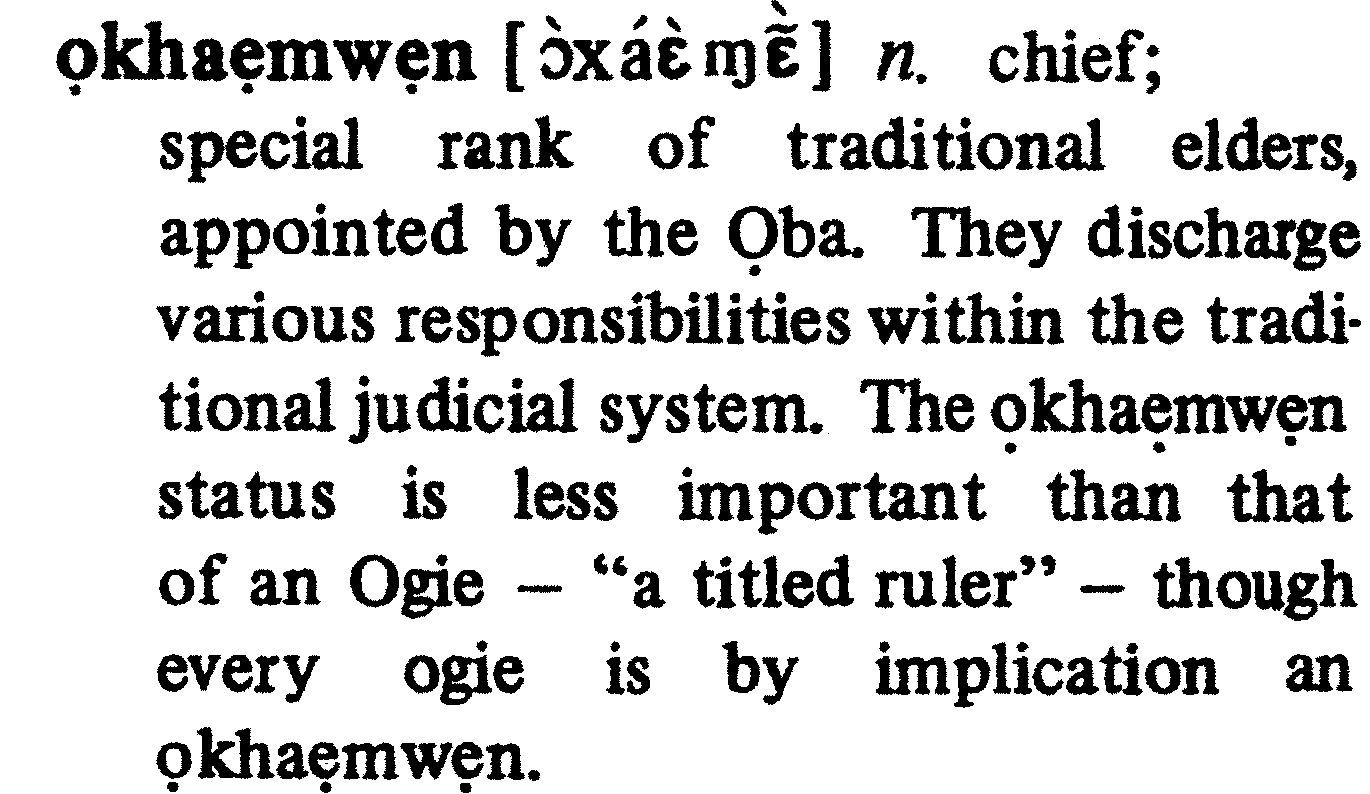
ọkhaẹn [ɔ̀xã́ɛ̃̀] n. porcupine.

ọkhan [ɔ̀xã̀] n. 1. termites; 2. white
ants.

ọkhẹ [ɔ̀xɛ́] n. hunter’s ambush in the
wild.
$Page 121$

ọkhẹn [ɔ̀xɛ̃̀] n. clientele; customers!
Obọ ọre tie okhẹn ― “His hands
invites clientele; i.e. His patronage
attracts additional clientele”.

ọkhẹrhẹ [ɔ̀xɛ̀řɛ̀] n. a young palm tree.

ọkhọe [ɔ́xɔe] n. worm; larva.

ọkhọkhọ [ɔ̀xɔ́xɔ̀] n. chicken; hen;
fowl: iyọkhọkọ (iye ọkhọkhọ)
“mother-hen”: a fully-developed hen.

ọkhọnmwọn [ɔ̀xɔ́ɱɔ̃̀] n. a person suf-
fering from a long-term or chronic
illness: ọkhọnmwọn ― oti ― “leprosy
patient”.

ọkhọọ [ɔ̀xɔ̀ɔ́] n. evil deed; malicious
act; mischief: ọkhọọ bun ibieka na
gbe ― “These children are fond of
(performing) mischief.”

Ọkhuahẹ [ɔ̀xùáhɛ̀] n. 1. the name of
a river in an Edo village by the same
name, situated along Benin-Asaba road;
2. the name of a famous magician
during the reign of Oba Ewuare. He
is said to have transformed himself
into the river Ọkhuahẹ, and is wor-
shipped today as a deity.
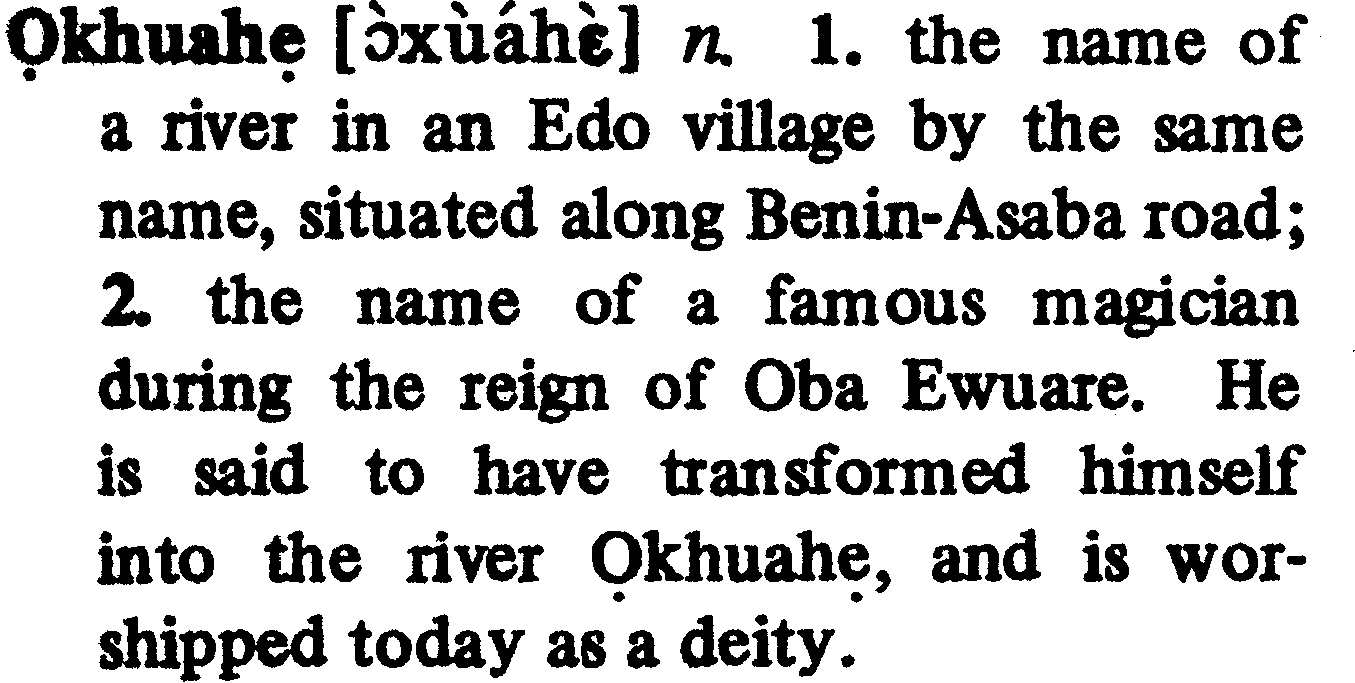
ọkhuẹ̀ [ɔ̀xwɛ̀] n. parrot.

ọkhuẹ́ [ɔ̀xwɛ́] n. “small chop”; snacks
bought and consumed compulsively
(usually due to lack of selfdiscipline)
Ọ ya ígho ẹre hia rri ọkhuẹ́ foo ―
“She spent all her money compulsively
buying and consuming snacks.”^
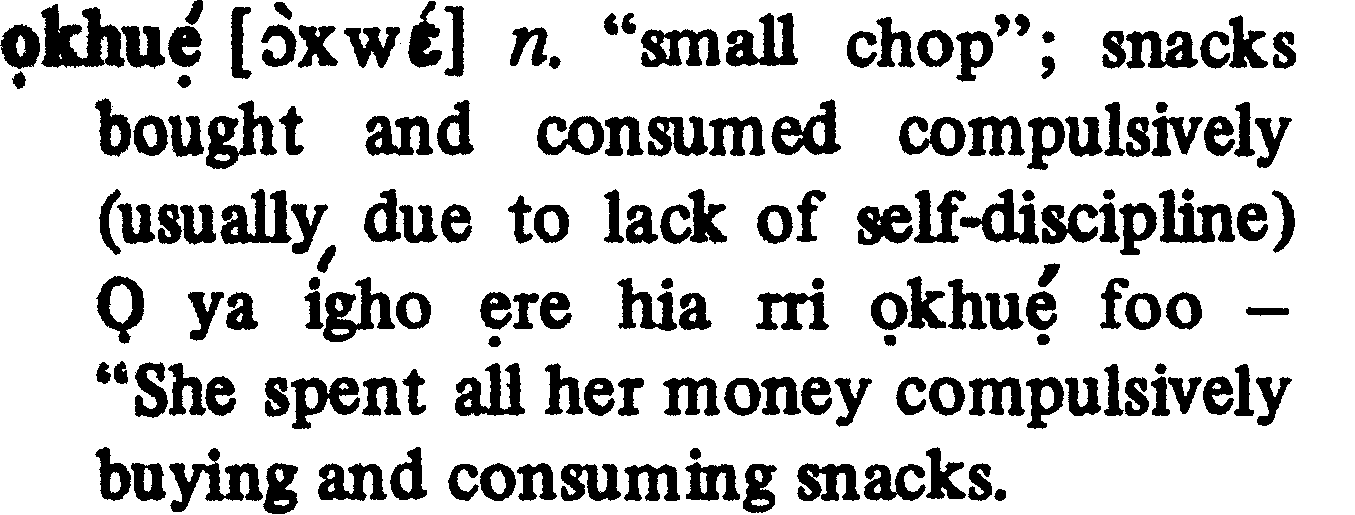
ọkhuẹn [ɔ́xwɛ̃́] n. a tree (Brachystegia
eurycoma).

ọkhuẹnkhuẹn [ɔ́xwɛ̃xwɛ̃̀] n. a variety
of thorny creeping plant.

ọ́kpa [ɔ́k͡pá] num. one; single: ebe
ọkpa ― “one book.”
%%

ọ̀kpa [ɔ̀k͡pà] n. rooster (also ọkporhu).

ọkpá [ɔ̀k͡pá] n. 1. rod, staff; 2. a yard
measure: Ọkpa enẹ ukpọn na khin ―
“This cloth is four yards long.”

ọkpakpata [ɔ̀k͡pàk͡pàtà] n. (< ọ-kpe-
akpata) akpata player (usually
accompanies the playing with a chant
of folk narratives).

ọkpan1 [ɔ́k͡pã́] n. plate.

ọkpan2 [ɔ́k͡pã́] num. odd number.

ọkpankpan [ɔ̀k͡pã́k͡pã̀] n. anger born
of frustration: Ghẹ ya ọkpankpan
so mwẹn ― “Don’t vent your frustra-
tion on me.”

ọkpatalẹ [ɔ̀kpàtàlɛ̀] n. severe case of
gonorrhoea.

ọkpayan-uri [ɔ́kpáỹãurì] num. 1. 201;
2. (idiomatic): innumerable.

ọkpema [ɔ̀kpèmà] n. drummer.

ọkpẹn [ɔ̀kpɛ̃́] n. side of; edge of: Ọ
mudia ye ọkpẹn úkpo ― “He stood
at the side of the road.”

ọkpẹnzẹ [ɔ̀kpɛ̃́zɛ̀] n. (< ọkpẹn-ẹzẹ)
bank of the river.

ọkpẹtu [ɔ̀kpɛ̀tú] n. a disagreeable
event, or person: a nuisance.

ọkpo1 [ɔ̀kpò] n. pile; haemorrhoids.

ọkpo2 [ɔ̀kpò] n. goal; score (e.g. in a
soccer game).

ọkporhu [ɔ̀kpòřù] n. 1. rooster; 2.
preacher.

ọkpọ [ɔ̀kpɔ́] n. walking stick; staff.

ọkpọkpa [ɔ́kpɔ́kpà] n. one by one.
$Page 122$

ọkpọmwan [ɔ̀kpɔ̀ɱã̀] n. attendant; as-
sistant; servant.

ọkpọnmwẹnse [ɔ̀kpɔ̃̀ɱɛ̃̀sè] n. a grate-
ful person.

ọlẹla [ɔ̀lɛ̀lá] n. hall-way; passage way.

ọlọghọmwan [ɔ̀lɔ̀ɣɔ̀ɱã̀] n. problems;
hardship.

ọma [ɔ̀mã̀ã́] n. goodness.

ọmada [ɔ̀mã̀dà] n. the Ọba’s cere-
monial sword bearer (pl. emada).

ọmaẹn [ɔ̀mãɛ̃̀] n. old person; the
aged.

ọmakhe [ɔ̀màxè] n. (< ọ ― ma ―
akhe) potter.

ọmamwaenmwin [ɔ̀màɱãẽ̀ɱĩ̀] n. (<
ọ ― ma ― emwan ― emwin) teacher
(also etisa).

ọmerhan [ɔ̀méřã̀] n. (< ọmọ ― erhan)
fruit.

ọmiọmwanfan [ɔ̀myɔ̀ɱã̀fã̀] n. (< ọ ―
miẹ ― ọmwan ― fan) saviour (in the
Christian sense).

ọmiwu [ɔ̀míwù] n. direct off-spring, as
opposed to eyẹ ― “grandchild.”

ọmobọ [ɔ̀móbɔ̀] n. (< ọmo-obọ) “child
of the arm”: infant.

ọmotọ [ɔ̀mótɔ̀] n. (< ọmo-otọ): “child
of the soil”: native, indigene.

ọmọ [ɔ̀mɔ̃́] n. 1. child; off-spring (pl.
emọ): Emọ eha ọ mwẹn ― “He has
three sons”^; 2. (of a plant or tree):
fruit.

Ọmọ [ɔ̀mɔ̃́] n. an appellation for the
Ọba: “Ọmọ n’Ọba n’Ẹdo” ― “Ọmọ,
%%

the ruler of Benin.”

ọmọbe [ɔ̀mɔ̃̀bè] n. problem child.

ọmọmọ [ɔ́mɔ̃́mɔ̃́] n. baby; infant.

ọna [ɔ̀nã̀] dem. pronoun. this one (pl.
ena): Ọna ọ ma sẹ ehia: “This one
is the best of them all.” (also ọnọna).

ọnii [ɔ́nĩ̀ĩ́] dem. den.pron. that one (pl.
enii): Ọnii ọ yẹ mwẹn ― “That one
is what I like.”

ọpakharha [ɔ̀páxářá] n. empty boasts;
bluff.

ọpẹkhẹrhẹ [ɔ̀pɛ̀xɛ̀řɛ̀] n. yam pottage.

ọpia [ɔ́pià] n. cutlass; machete.

ọpọrhipọ [ɔ̀pɔ̀řípɔ̀] n. a tree, Sterculia
tragacaniha.

ọra [ɔ̀ɽá] n. dried okra (sliced and dried
in the sun, to last longer).

ọre1 [ɔ̀rè] cop. 1. serves as the link
between a focalized element in a
sentence and the rest of the sentence:
owa ọre ọ na vbaa re ― “Home it was
that he met him: it was at home that
he met him.”; 2. serves as a link
between clauses or sentences in a
narrative discourse: Iran ghi sẹ evba,
ọre iran na tuẹ ọre; ọre iran na tota ―
“When they got there, they greeted
him, they then sat down . . . ” (variant
form is ẹre).
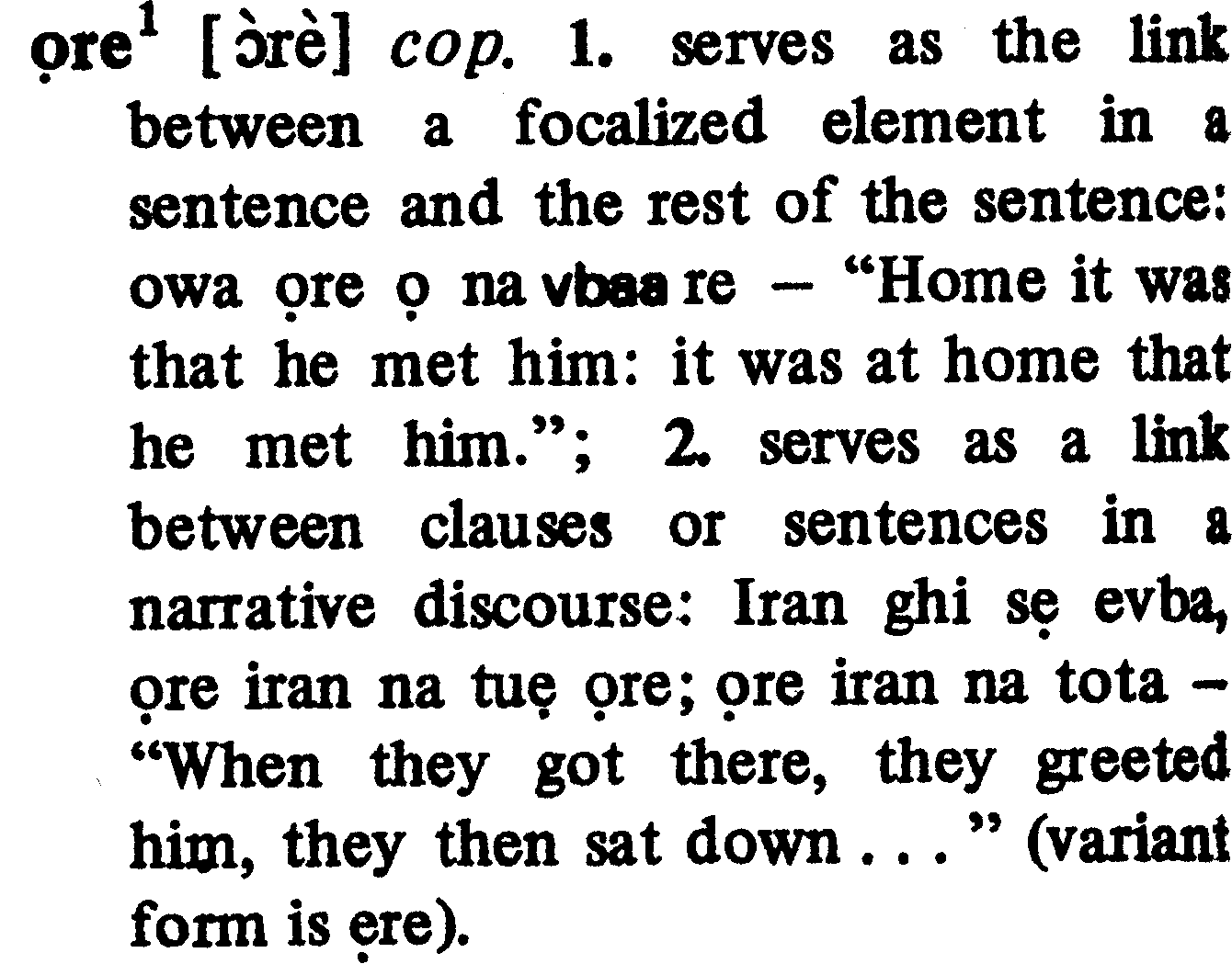
ọre2 [ɔ́ɽè] pron. 3rd pers. sg. posses-
sive pron: his, her, its: owẹ ọre ― “his/
her/its feet.” (Variant forms: ẹre,
ọnrẹn, ẹnrẹn, re, rẹn).

ọrẹrẹ [ɔ̀ɽɛ̀ɽɛ̀] n. a variety of beans.

ọrọ [ɔ̀ɽɔ̀] n. paralysis.
$Page 123$

ọrọgiọ [ɔ̀rɔ̀gyɔ̀] n. a kind of wooden
rattle.

ọrue [ɔ̀ɽúè] n. co-wife.

ọruero [ɔ̀ɽwèɽò] n. (< ọ-ru-ero) a
cunning person; a deceitful person.

ọruẹbọ [ɔ̀ɽwɛ̀bɔ̀] n. (< ọ-ru-ẹbọ) pagan.

ọruosa [ɔ̀ɽwòsà] n. (< ọ-ru-osa) debtor.

ọrhẹnrhẹn [ɔ̀řɛ̃̀ɛ̃́řɛ̃̀] n. a lot; a large quan-
tity: Ígho ne ọ mu rre ọrhẹnrhẹn ― “The
money he brought was a whole lot.”

ọrhẹnrhẹnbiẹnrhẹn [ɔ̀řɛ̃̀řɛ̃̀bĩɛ̃řɛ̃̀] adj.
very large or numerous.

ọrhiae [ɔ̀řiáè] n. useless thing; a no-
good (person or thing).

ọrho [ɔ̀řò] n. mud; slush.

ọrhọre [ɔ̀řɔ̀ɽé] n. waterfall.

ọrhomwungborrie [ɔ̀řɔ́ɱũ̀gbóryè] adj.
numerous: Ma dẹghe ọrhọvbungborrie
ẹvbo ne i rre ― “We saw the numerous
people that came.”

ọrriegie [ɔ̀ryègyè] n. (< ọ-rri-egie) title-
bearer; a titled person.

ọrriọvbe [ɔ̀ryɔ̀ʋè] n. alien; stranger;
foreigner.

ọrriukhu [ɔ̀ryùxù] n. (< ọ-rri-ukhu)
heir; inheritor.

ọsa [ɔ̀sà] n. big ape: gorilla; chimpanzee.

ọsama [ɔ̀sàmà] n. 1. (< ọ-sa-ama) brass-
smith; 2^.^ sculptor.

ọsara [ɔ̀sáɽà] n. saw (carpenter’s imple-
ment).

ọse [ɔ̀sè] n. 1. friend; 2. lover.
%%

ọsegbe [ɔ̀ség͡bè] n. in turns; turn by
turn (also the reduplicated form:
ọsegbe-ọsegbe).

ọsẹlẹ [ɔ́sɛ̀lɛ́] n. cricket (also asẹlẹ).

Ọsẹmwẹndẹ [ɔ̀sɛ́ɱɛ̃̀dɛ́] n. name of a
past Ọba of Benin.

ọsiwu [ɔ̀sìwù] n. the tribal mark cutter
(no longer in practice).

ọsuohuan [ɔ̀swòhw̃ã̀] n. (< ọ ― su ―
ohuan): “leader of sheep”: shepherd.

ọta [ɔ̀tá] n. speech; conversation: Iran
gha gbe ọta vba ― “They are con-
versing there.”

ọtakhọ [ɔ̀tàxɔ́] n. back-biting; slander.

ọtan [ɔ̀tã̀] n. squirrel.

ọ́tẹn1 [ɔ́tɛ̃́] n. a very sweet drink
made from fermented ripe plantains.

ọ̀tẹn2 [ɔ̀tɛ̃́] n. 1. general blood rela-
tive: Ọtẹn ma khin ― “We are blood
relatives”; 2. sibling; 3. an address
term for anybody one feels favourably
disposed toward: Ghe gui ọtẹn mwẹn
― “Don’t be offended please.”
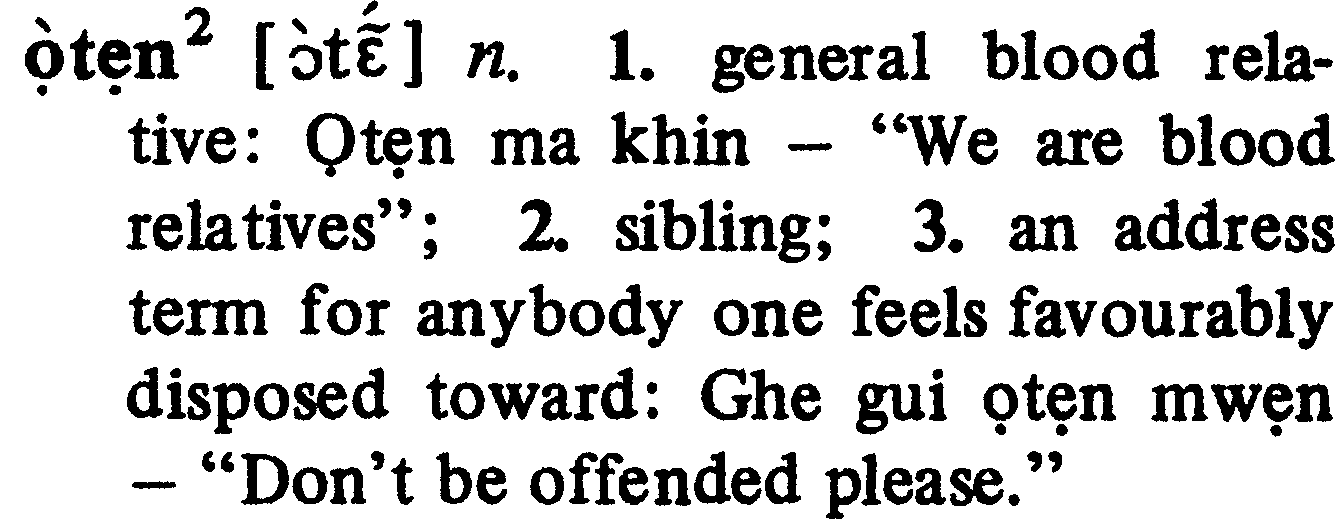
ọtọn [ɔ̀tɔ̃̀] n. rust.

Ọvia [ɔ̀vyá] n. 1. the name of a river;
2. the name of the goddess of Ovia
river, and the cult that worships it.

ọviẹn [ɔ̀vyɛ̃́] n. slave; servant.

ọvo [ɔ̀ʋó] n. half-heartedness; disinclina-
tion. (also in the reduplicated form:
ọvọvo): Ọvọvo o ya ru iwinna na ―
“He did this work half-heartedly.”

ọmwan [ɔ̀ɱã́] n. person; human being
(pl.: emwan): emwan nibun ― “Many
people.”
$Page 124$

ọmwanbabe [ɔ̀ɱã̀bàbè] n. a witch
(also azẹn).

ọmwẹnmwẹn [ɔ̀ɱɛ̃́ɱɛ̃̀] n. a mad per-
son.

ọvbehe [ɔ́ʋèhé] n. another one; an-
other.

ọvbokhan [ɔ̀ʋóxã̀] n. 1. child; a young
person, hence ọvbokhonkhuo (<
ọvbokhan-okhuo): girl; ọvbokhonkpia
(< ọvbokhan ― okpia) “boy”; 2.
servant, assistant; 3. (also with low
tones: ọvbokhan ) “wife” ― always
occurs with a possessive: ọvbokhan
mwẹn ― “my wife.”
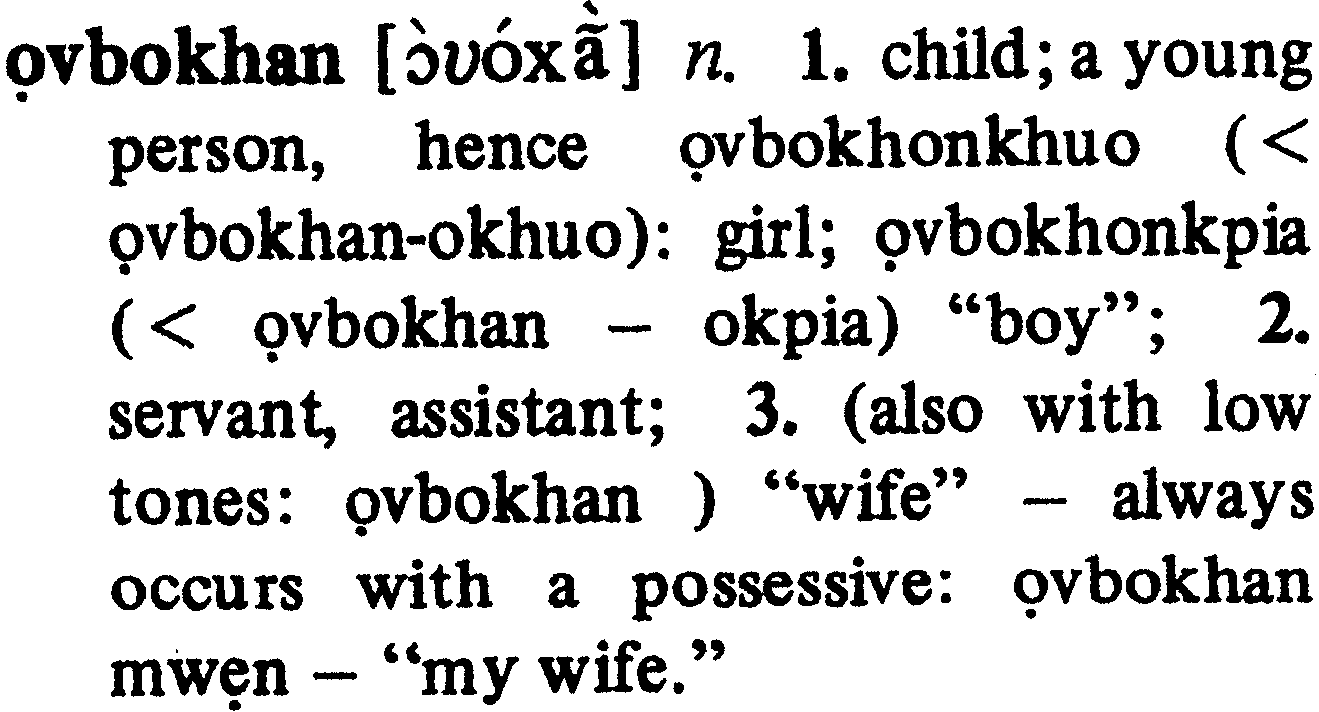
ọvbokhunvbi [ɔ̀ʋóxũ̀ʋí] n. a girl or
young woman (in her mid to late
teens).

ọ́wa [ɔ́wá] n. epilepsy.

ọ̀wa [ɔ̀wà] n. castrated animal: ẹwe
ọwa ― “castrated goat.”

ọwara [ɔ̀wàɽà] n. 1. straight, uninter-
rupted stretch (of time or space):
ọwara uki eha ― “for an uninter-
rupted period of three months.”

ọwẹ [ɔ̀wɛ̀] n. male (used of animals
only).

ọwẹe [ɔ̀wɛ́è] n. farmer (also ọgbugbo).
%%

ọwẹwẹ [ɔ̀wɛ́wɛ́] n. a kind of native
explosive fired like a gun at second
burial ceremonies.

ọwiẹyi [ɔ̀wiɛ̀yí] n. used item; second-
hand.

ọwọ [ɔ̀wɔ̀] n. a variety of house-bat.

ọyarra [ɔ̀yàrá] n. an uncouth person.

ọyẹnmwẹn [ɔ̀ỹɛ̃̀ɱɛ̃̀] n. joy; merriment.

ọyunnua [ɔ̀ỹũ̀nw̃ã́] n. a surprise;
amazement.

ọza [ɔ̀zá] n. a sash used by a woman
for tying a baby to the back.

Ọza [ɔ̀zà] n. the name of an Edo-
speaking community, whose dialect
of Edo is quite distinct.

ọzedu [ɔ̀zèdù] n. (< ọ-zẹ-edu) inter-
preter.

ọzẹba [ɔ̀zɛ̀bá] n. a sticky and unanti-
cipated problem.

Ọzọlua [ɔ̀zɔ̀luà] n. the name of a
past Oba of Benin. He was the father
of Ọba Ẹsigie.

ọzuọ [ɔ̀zuɔ̀] n. fool; idiot.
